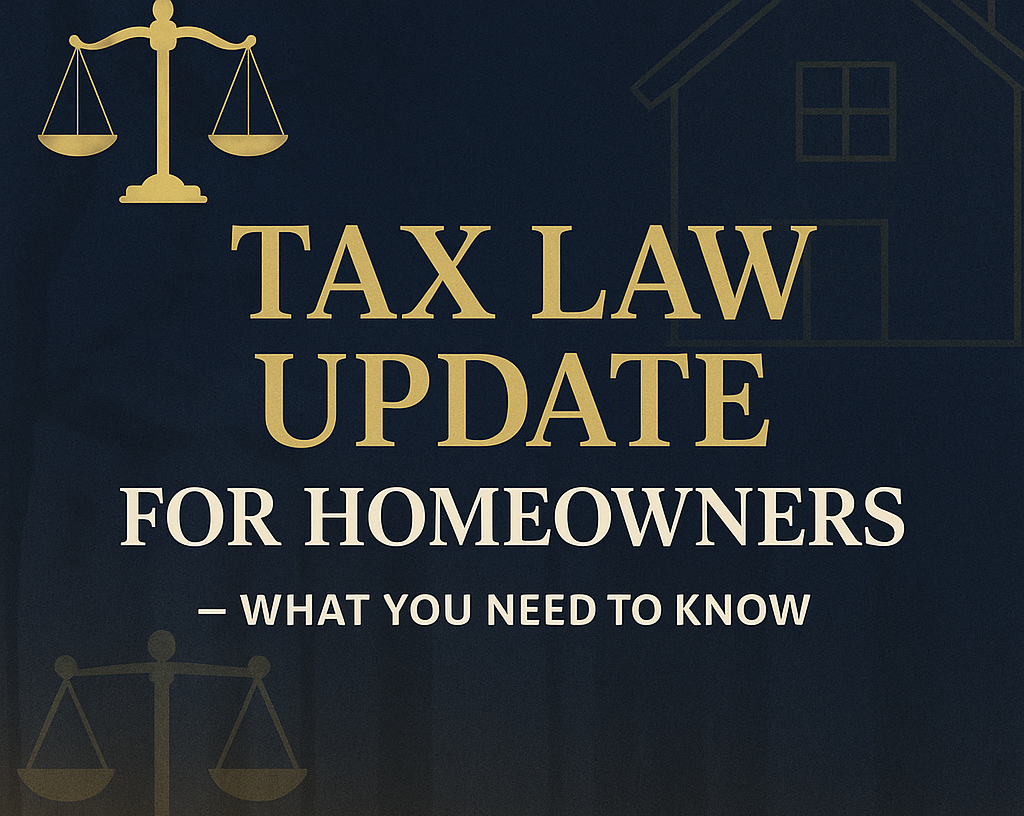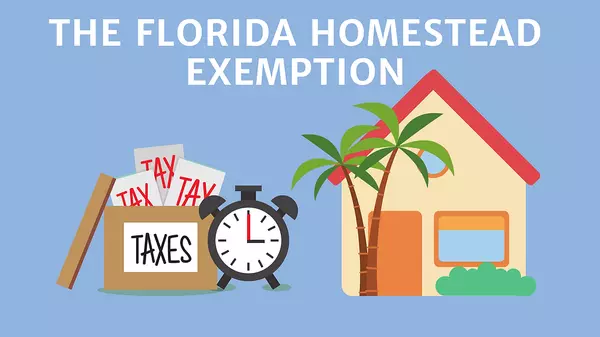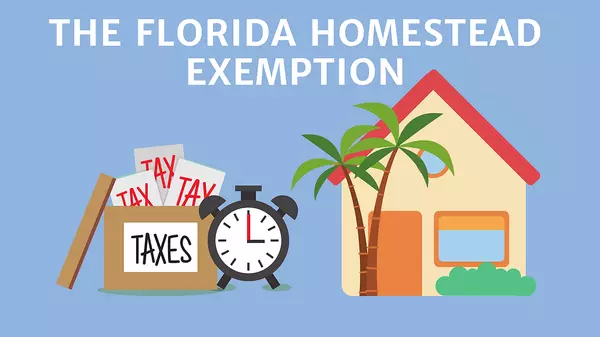What Homeowners Need to Know About the New Tax Law Changes


As we move through 2025, important tax law updates have gone into effect that could directly impact homeowners, buyers, and sellers. Staying informed is key not only to protecting your investment but also to making the most strategic financial decisions about your property. Below we break down the key changes and what they mean for you.
🔑 Key Highlights of the Changes
-
Property Taxes & Deductions: Big news for property tax deductions: for tax years 2025 through 2029, the cap on state and local tax (SALT) deductions (which includes property taxes) jumps from $10,000 to $40,000 per year. This higher limit is a relief for homeowners in high-tax areas who previously hit the old cap (Starting in 2030, the cap is scheduled to revert back to $10,000 unless Congress acts again. Note that the full $40k deduction is mostly available to middle-income households – very high earners (over ~$500,000 income) will see the benefit phased down above that level. If you itemize deductions on your tax return, this change means you may be able to deduct a much larger portion of your property tax bill, reducing your taxable income each year.
-
Homeownership Costs: Some tax breaks related to homeownership costs are shifting. The rule that limits the mortgage interest deduction to the first $750,000 of home loan debt has now been made permanent (it was originally set to expire after 2025). In practice, this means interest on mortgages above $750k remains non-deductible beyond that cap, so buyers of higher-end homes should plan accordingly. Interest on home equity loans also remains deductible only if those loans were used to buy or improve your primary or second home (and such debt counts toward the same $750k total limit). On the plus side, mortgage insurance premiums – such as PMI on conventional loans, FHA mortgage insurance, VA funding fees, and USDA guarantee fees – are once again tax-deductible going forward. (This deduction for mortgage insurance will phase out for taxpayers with incomes over $100,000, or $50,000 if married filing separately.) These changes could affect what costs you can write off, so homeowners should review their loan details and tax strategy each year.
-
Investment Properties: If you own rental properties or are considering investing, the new law brings several investor-friendly updates. You can still defer capital gains taxes by using 1031 like-kind exchanges when you sell one investment property and buy another. Long-term capital gains tax rates on real estate sales also remain low and unchanged (there were talks of raising them, but that didn’t happen). In addition, rental income continues to qualify for a 20% tax deduction under the Qualified Business Income (QBI) rules – and this 20% write-off for pass-through rental income is now permanent. In simple terms, if you have $100,000 in net rental profits, you might only pay tax on $80,000 after this deduction. On top of that, 100% bonus depreciation has been restored through 2030 allowing real estate investors to write off a large portion of a property’s cost in the first year. These combined benefits can significantly improve the after-tax returns on investment properties, making real estate an even more attractive investment if approached wisely.
-
Future Planning (Estate & Inheritance): Estate planning and inheritance rules for real estate have been updated in 2025’s tax law. The amount you can pass to heirs tax-free has increased substantially: beginning in 2026, the federal estate and gift tax exemption will be $15 million per individual (or $30 million for a married couple), up from roughly $13 million per person today. This higher permanent exemption means far fewer families will owe any federal estate tax when passing down homes or other property. Just as importantly, the favorable “step-up in basis” rule for inherited assets remains intact. That means if your children inherit your home, the tax basis of the property will reset to its current market value at the time of inheritance, potentially minimizing capital gains taxes if they later sell. These changes give homeowners more flexibility (and tax savings) when passing real estate to the next generation. However, it’s still wise to review your estate plan with these new rules in mind, especially if your property assets are substantial or if you live in a state with its own inheritance taxes.
💡 Why This Matters
Buying, selling, or holding real estate is not just about location and timing it’s also about understanding the financial implications behind each decision. Tax law changes can directly affect your bottom line. While these updates are designed to keep the tax system up to date and in compliance, they can also present opportunities if approached strategically. For instance, being aware of a new or expanded deduction might influence when you choose to make home improvements or sell an investment property. On the other hand, not knowing about a rule change could mean missing out on savings or getting an unpleasant surprise at tax time. In short, knowledge is power: understanding these tax changes can help you maximize benefits and avoid costly mistakes in your real estate journey.
🏡 How Homes Unlimited Can Help
At Homes Unlimited | Made Simple, I work closely with clients to ensure their real estate goals stay aligned with the latest financial and legal updates. Tax laws can be complex, but you don’t have to navigate them alone. Whether you’re a first-time buyer trying to understand your deductions, an experienced investor re-evaluating your strategy, or a homeowner planning to sell, I can guide you through how these changes may apply to your unique situation. Our goal is to help you make informed decisions from purchase to sale and everything in between so that you not only find the right property, but also optimize the financial outcomes of each transaction in light of current tax laws.
✅ Next Steps
If you have questions about how these 2025 tax law updates could impact your homeownership journey, I encourage you to reach out today. Don’t wait until tax time to discover how a change might affect you. Knowledge is power, and having the right guidance can save you time and money. Feel free to contact me for a personalized discussion about your situation together, we’ll make sure you’re taking full advantage of the opportunities these new rules provide, while avoiding any pitfalls. Your home is more than just an investment in property; it’s an investment in your future, and I’m here to help you protect it.
📞 Call or text me at 407-378-5600 | 🌐 Visit homesunlimited.solutions | ✉️ Or email me directly at dgonzalez@homesunlimited.solutions
Sources
-
U.S. House of Representatives – Tax Relief for American Families and Workers Act of 2024 (SALT cap adjustment through 2029)
-
Internal Revenue Service (IRS) – Mortgage Interest Deduction Guidance (permanent $750,000 cap)
-
National Association of Realtors (NAR) – Summary of Real Estate–Related Tax Provisions (mortgage insurance premium deduction, QBI deduction, bonus depreciation)
-
Congressional Research Service – Federal Estate and Gift Tax Changes for 2026 (exemption raised to $15M per individual)
-
IRS Tax Code – Step-Up in Basis Rules (inheritance of real property)
Recent Posts











"My job is to find and attract mastery-based agents to the office, protect the culture, and make sure everyone is happy! "
dgonzalez@homesunlimited.solutions
8803 Futures Drive Unit 10A, Orlando, Florida, 32819, USA
